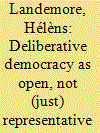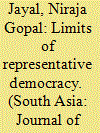|
|
|
Sort Order |
|
|
|
Items / Page
|
|
|
|
|
|
|
| Srl | Item |
| 1 |
ID:
154142


|
|
|
|
|
| Summary/Abstract |
Deliberative democracy is at risk of becoming collateral damage of the current crisis of representative democracy. If deliberative democracy is necessarily representative and if representation betrays the true meaning of democracy as rule of, by, and for the people, then how can deliberative democracy retain any validity as a theory of political legitimacy? Any tight connection between deliberative democracy and representative democracy thus risks making deliberative democracy obsolete: a dated paradigm fit for a precrisis order, but maladjusted to the world of Occupy, the Pirate Party, the Zapatistas, and other antirepresentative movements. This essay argues that the problem comes from a particular and historically situated understanding of representative democracy as rule by elected elites. I argue that in order to retain its normative appeal and political relevance, deliberative democracy should dissociate itself from representative democracy thus understood and reinvent itself as the core of a more truly democratic paradigm, which I call “open democracy.” In open democracy, popular rule means the mediated but real exercise of power by ordinary citizens. This new paradigm privileges nonelectoral forms of representation and in it, power is meant to remain constantly inclusive of and accessible–in other words open–to ordinary citizens.
|
|
|
|
|
|
|
|
|
|
|
|
|
|
|
|
| 2 |
ID:
092205


|
|
|
|
|
| Publication |
2009.
|
| Summary/Abstract |
We are conversant today with a variety of democratic deficits. There is the gap between the promise and performance of democracy; then there is also the gap between the success of procedural democracy and the failure of the project of substantive democracy. This paper reflects a different sort of democratic disappointment however. It is an interrogation, not of India's democracy per se, but of a particular strand of democratic discourse and practice in India that has become disconcertingly powerful in the last two decades. This is a line of argument that privileges representation-indeed a particular form of it-as the defining principle of democracy and in so doing, denudes the democratic ideal of all substantive content beyond representation. The microcosmic representation of all sections of the population in all institutions-not only those of public governance, but also others such as the media and the private sector-becomes the pursuit that inspires democracy, and as such every advance in this direction is seen to constitute a further deepening of democracy.
|
|
|
|
|
|
|
|
|
|
|
|
|
|
|
|
| 3 |
ID:
171331


|
|
|
|
|
| Summary/Abstract |
Epistocratic arrangements are widely rejected because there will be reasonable disagreement about which citizens count as epistemically superior and an epistemically superior subset of citizens may be biased in ways that undermine their ability to generate superior political outcomes. The upshot is supposed to be that systems of democratic government are preferable because they refuse to allow some citizens to rule over others. We show that this approach is doubly unsatisfactory: although representative democracy cannot be defended as a form of government that prevents some citizens from ruling over others, it can be defended as a special form of epistocracy. We demonstrate that well-designed representative democracies can, through treatment and selection mechanisms, bring forth an especially competent set of individuals to make public policy, even while circumventing the standard objections to epistocratic rule. This has implications for the justification of representative democracy and questions of institutional design.
|
|
|
|
|
|
|
|
|
|
|
|
|
|
|
|
| 4 |
ID:
133021


|
|
|
|
|
| Publication |
2014.
|
| Summary/Abstract |
This article studies the consequences of strategic voting by outcome-oriented voters in elections under proportional representation (PR). I develop a model of elections under PR, in which voters choose among an arbitrary finite number of parties, and the policy outcome is determined in a postelection bargaining stage. I use a new solution concept, robust equilibrium, which greatly mitigates the well-known problem of indeterminate predictions in multicandidate competition. Applying the equilibrium concept to the model, I find that PR promotes representation of small parties in general, even when voters are strategic. However, the median voter plays a critical role in shaping policy outcomes, which reflects the majoritarian nature of parliamentary policy making rules. Thus, PR may not be incompatible with the majoritarian vision of representative democracy if voters' main concern is policy outcomes.
|
|
|
|
|
|
|
|
|
|
|
|
|
|
|
|
|
|
|
|
|